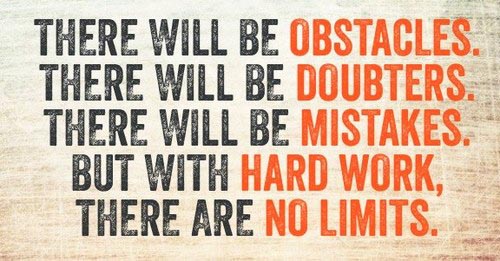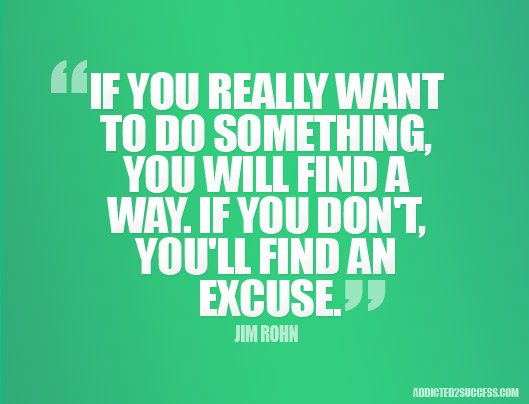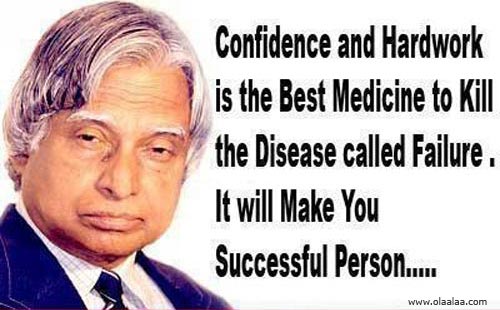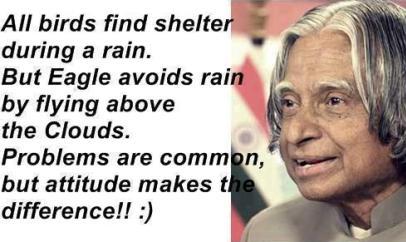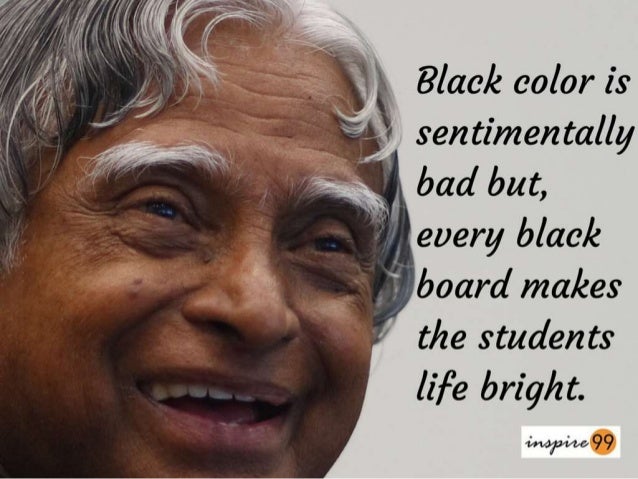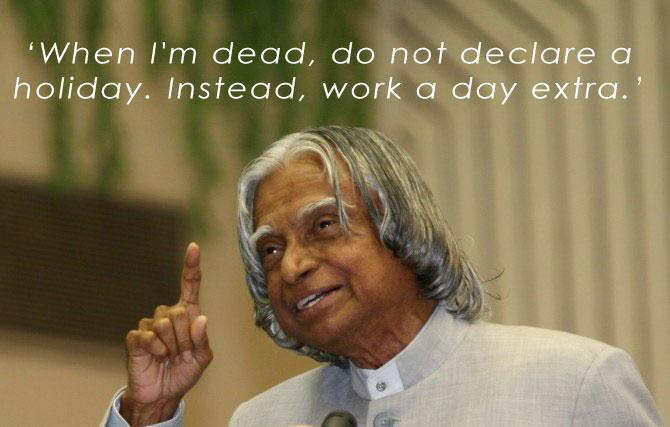
This Blog is all about Quotes and thoughts said by famous authors, celebrities, and newsmakers.
Saturday, 5 December 2015
Wednesday, 2 December 2015
Tuesday, 1 December 2015
6 Stories of Super Successes Who Overcame Failure

Failure is not the alternative to success. It’s something to be avoided, but it’s also only a temporary setback on a bigger, more significant course. Everybody encounters failure at one point or another. What truly matters is how you react to and learn from that failure.
Take the stories of these six entrepreneurs. Their stories end in massive success, but all of them are rooted in failure. They’re perfect examples of why failure should never stop you from following your vision.
1. Arianna Huffington got rejected by 36 publishers.
It’s hard to believe that one of the most recognizable names in online publications was once rejected by three dozen major publishers. Huffington’s second book, which she tried to publish long before she created the now ubiquitously recognizable Huffington Post empire, was rejected 36 times before it was eventually accepted for publication.
Even Huffington Post itself wasn’t a success right away. In fact, when it launched, there were dozens of highly negative reviews about its quality and its potential. Obviously, Huffington overcame those initial bouts of failure and has cemented her name as one of the most successful outlets on the web.
2. Bill Gates watched his first company crumble.
Bill Gates is now one of the world’s wealthiest individuals, but he didn’t earn his fortune in a straight line to success. Gates entered the entrepreneurial scene with a company called Traf-O-Data, which aimed to process and analyze the data from traffic tapes (think of it like an early version of big data).
He tried to sell the idea alongside his business partner, Paul Allen, but the product barely even worked. It was a complete disaster. However, the failure did not hold Gates back from exploring new opportunities, and a few years later, he created his first Microsoft product, and forged a new path to success.
3. George Steinbrenner bankrupted a team.
Before Steinbrenner made a name for himself when he acquired ownership of the New York Yankees, he owned a small basketball team called the Cleveland Pipers back in 1960. By 1962, as a result of Steinbrenner’s direction, the entire franchise went bankrupt.
That stretch of failure seemed to follow Steinbrenner when he took over the Yankees in the 1970s, as the team struggled with a number of setbacks and losses throughout the 1980s and 1990s. However, despite public fear and criticism of Steinbrenner’s controversial decisions, eventually he led the team to an amazing comeback, with six World Series entries between 1996 and 2003, and a record as one of the most profitable teams in Major League Baseball.
4. Walt Disney was told he lacked creativity.
One of the most creative geniuses of the 20th century was once fired from a newspaper because he was told he lacked creativity. Trying to persevere, Disney formed his first animation company, which was called Laugh-O-Gram Films. He raised $15,000 for the company but eventually was forced to close Laugh-O-Gram, following the close of an important distributor partner.
Desperate and out of money, Disney found his way to Hollywood and faced even more criticism and failure until finally, his first few classic films started to skyrocket in popularity.
5. Steve Jobs was booted from his own company.
Steve Jobs is an impressive entrepreneur because of his boundless innovations, but also because of his emphatic comeback from an almost irrecoverable failure. Jobs found success in his 20s when Apple became a massive empire, but when he was 30, Apple’s board of directors decided to fire him.
Undaunted by the failure, Jobs founded a new company, NeXT, which was eventually acquired by Apple. Once back at Apple, Jobs proved his capacity for greatness by reinventing the company’s image and taking the Apple brand to new heights.
6. Milton Hershey started three candy companies before Hershey's.
Everyone knows Hershey’s chocolate, but when Milton Hershey first started his candy production career, he was a nobody. After being fired from an apprenticeship with a printer, Hershey started three separate candy-related ventures, and was forced to watch all of them fail.
In one last attempt, Hershey founded the Lancaster Caramel Company, and started seeing enormous results. Believing in his vision for milk chocolate for the masses, he eventually founded the Hershey Company and became one of the most well-known names in the industry.
Draw inspiration from these stories the next time you experience failure, no matter the scale. In the moment, some failure might seem like the end of the road, but remember, there are countless successful men and women in the world today who are only enjoying success because they decided to push past the inevitable bleakness of failure.
Learn from your mistakes, reflect and accept the failure, but revisit your passion and keep pursuing your goals no matter what.
Abraham Lincoln Success Story
Synopsis
Known for his incredible leadership skills, fantastic speeches, and incredibly sharp political abilities, Abraham Lincoln is one of the Western world’s most well-known and widely respected political leaders. The 16th President of the United States and the nation’s leader during a time of crisis, Abraham Lincoln is a true success story.
Childhood
Born on February 12, 1809, Abraham Lincoln grew up in modest surroundings. As a young child, Lincoln was raised in Kentucky by his parents, with his father Thomas a local business and social leader. However, his father lost the majority of his assets in legal cases, forcing the family to move to Indiana – at the time, part of the frontier.
Abraham Lincoln was not regarded as a particularly hardworking child. Instead of adapting to frontier life and embracing the hard labor associated with it, Abraham retreated into books and self-education. He did, however, gain a local reputation as an expert fighter after defeating one of his town’s bullies in a wrestling match.
When people discuss Abraham Lincoln in modern society, they typically talk about his incredibly oratory skills and leadership abilities. What few people know is that the young Abraham Lincoln had a very limited education that consisted of roughly one year of formal schooling from unskilled and poorly trained local teachers.
Instead of accepting his lack of education, Abraham Lincoln became a voracious and passionate reader. He avidly reached for new books as quickly as he could, finishing advanced titles such as Benjamin Franklin’s Autobiography and Classic Greek poems and novels. In his early teens, Lincoln was constantly focused on reading new books.
Early Career
In his early twenties, Abraham Lincoln invested in a local general store with one of his close friends, located in New Salem, Illinois. The business fell apart, forcing the young Lincoln to sell off his share and accept his loses. Disappointed with the world of business, Lincoln started his political with a run for the Illinois General Assembly.
His political career, unfortunately, was also a failure, with Lincoln finishing eighth out of thirteen candidates. Disappointed with his failure, Lincoln again retreated to the world of books. This time, his reading had a definite focus – he would learn the law for himself, becoming a lawyer in the process, and run for public office again.Just like his self-education allowed him to escape from his home and turn towards a political career, Abraham Lincoln’s self-educated legal skills made him one of the top candidates in the House of Representatives election. Lincoln eventually served four terms in the house, making him a leader in local politics in Illinois.
Career
A staunch Whig Party advocate, Lincoln was then elected to the United States House of Representatives in 1846. It was during his congressional career that Lincoln took an at-the-time bold stance against slavery, attempting to introduce a bill that would ban slavery in Washington D.C. and compensate current slave owners.After his short career in the House of Representatives, Lincoln distanced himself from the world of politics and worked as a lawyer in Illinois. For sixteen years, he worked on behalf of both large companies and individuals in the state, working on some of the most influential and important cases of his day.
In 1858, growing disappointed with the direction of the Whig Party, Lincoln entered the world of politics again, this time siding with the then-new Republican Party. The young Abraham Lincoln chose the 1958 Senatorial Election for Illinois as his second entry point in politics, aiming to defeat the Democratic Senator Stephen Douglas.
Despite gaining a larger share of the popular vote than his opponent, Lincoln lost the election and missed out on the position. He did, however, secure a great deal of large scale support in the Republican Party, which allowed him to pursue an even greater goal – the Presidency of the United States – just two years later in 1860.Lincoln built a campaign that revolved around the issue of slavery – at the time an incredibly contentious and divisive issue in the United States. He won the election with a huge majority, beating out his opponents combined.
Unfortunately, many of the southern states, which supported slavery, took the opportunity to depart from the Union before he took office. As South Carolina, Texas, Florida, and four other states departed from the Union, Lincoln and then-President Buchanan witnessed the start of the country’s largest internal war.
Lincoln’s involvement in the American Civil War is well documented and incredibly detailed, with entire books written about single battles. If there’s one moment that stands out from his tenure during the Civil War, it would be his passing of the well-known Emancipation Proclamation, a leading bill in freeing the many African slaves.In the year that followed, Lincoln managed the Union war effort, culminating in his well-known speech at Gettysburg following the incredible Union victory there. The battle proved a turning point in the war, giving the Union forces the might and drive that they required to capture the southern states and win the Civil War.
After rebuilding the United States and driving the country forward beyond the era of slavery, Lincoln continued to advocate for civil rights. He suggested giving the ability to vote to black slaves, something that incensed his detractors. On April 14th, 1865, a one John Wilkes Booth – a Confederate spy – assassinated Abraham Lincoln during a performance of Our American Cousin.
Lincoln’s success as a political leader and his immense approval and near mythical status in American politics today didn’t stem from a privileged upbringing or great education. It stemmed from his immense drive and determination, and his skills in educating himself when others refused to help him learn with their help.
A self-proclaimed bookworm, Lincoln read huge amounts of books during his teens and early adulthood, claiming that his self-taught learning style is what helped him in achieving his success. If there’s one great lesson of Abraham Lincoln’s life, it’s that everyone – regardless of their background – can educate themselves to the point of being able to achieve truly great things in their lives.
Mahendra Singh Dhoni Success Story
Childhood
Mahendra Singh Dhoni was born on July 7, 1981 at Ranchi, Jharkhand located in the east corner of India. He studied at DAV Jawahar Vidya Mandir where he was keenly interested in football and badminton. He was the goalkeeper of his football team and was able to play for the district and state level. But on the insistence of his football coach, he tried out to play cricket.
Early Career
He was able to perform wicket keeping especially well which allowed him entry into a local cricket club called the Commando cricket club where he played from 1995-1998. In the 1997/98 season, his superb performances in the Vinoo Mankad Under-16 Championship attracted the selector’s eye.
He was selected to the Bihar U-19 squad the very next season. His improved batting and keeping performances led him to be selected to the Bihar Ranji Trophy squad for the 1999/00 season. He made his debut against the Assam team by scoring an unbeaten score of 68.
He scored his first century the next season but was only able to score at a average of around 40 per game by the 2003 season. In 2003, he was selected to the India A team which went to tour Kenya to play a tri-series tournament with Pakistan A as the third team. In the series he scored 362 runs at an average of 72.40 with back to back centuries against Pakistan.
On the back of his sterling performances in domestic competitions and international tours, he was given a place in the ODI squad for the tour to Bangladesh in 2004/05. On his debut he was run out for a duck but in his 5th ODI match against Pakistan, he scored 148 off 123 balls to be called a match winning player in the Indian squad. With this performance he had now recorded the highest score by an Indian wicket keeper as well as cemented his place in the side.
In November 2005, while chasing a stiff target of 299, he scored 183 off 145balls to take India to victory. He won the ‘Man of that Series’ award for top scoring in the tournament with 346 runs. In the 2007 World Cup he could only score 29 runs in the 3 matches with two ducks which contributed to the knockout in the group stages. Again Dhoni bounced back with impressive performances which led him to be made the captain of the Indian T20 squad in September 2007. He immediately made impact as he led the team to win the inaugural World Cup T20 in South Africa.
As a Captain
He was made the captain of the ODI team in 2007 and the Test team in 2008. In 2009, he scored 1198 runs in 24 innings at an average of 70.43 to be the highest scorer of the year in ODI’s.
In the same year under his captaincy, India was able to draw against South Africa 1-1 to become the No.1 Test team in the world. He also hit an unbeaten 91 to beat Sri Lanka in the 2011 World Cup finals making him one of the most successful captains in the history of Indian cricket.He is the holder of numerous awards in international cricket.
He has been part of the ICC World ODI XI for 6 years in a row from 2008-2013. He has been awarded the Rajiv Gandhi Khel Ratna which is the highest sports honor given by the government of India in the year 2008. He advertises more than 15 products as of 2013 and is one of the most marketable players in the world. In June 2013, he was reported to be the 16th highest paid sportsman in the world with yearly earnings of $31 million. He is one of the most successful Indian sportsmen that the world has ever seen.
10 Motivational Quotes By Dr. APJ Abdul Kalam
We all know that the Missile Man, Dr. APJ Abdul Kalam, breathed his last on 27th of July, 2015; a big loss to the whole of India and to the field of science and technology. Popularly known as “People’s Prez” this man was a humble and a true human being. He wanted to make India an educated country. He had been a source of inspiration to many and many have learnt a lot from him to improve themselves.

He’d been into writing too and some famous and inspirational quotes will always motivate us so that we do not deviate from our path. Though he’s no more with us, his books, his teachings, and his contribution shall always remain immortal.
Here’s a peep into some inspirational and motivational quotes by Dr. APJ Abdul Kalam.
1. “Don’t take rest after your first victory, because if you Fail in the second, more lips are waiting to say that your first Victory was just Luck”
2. “If You want to shine like a Sun, first burn like a Sun”
3. “If you Fail, never give up because FAIL means-“First attempt in learning”. End is not end, in-fact END means- “Effort Never Dies”. If you get a No as an answer, remember NO means- “Next Opportunity”
4. “One Best Book is equal to Hundred Friends but one good Friend equals a Library”
5. “Success is- When your signature changes into autographs, this marks Success”
6. “Black colour is Sentimentally bad, but Black Board makes the student’s life Bright”
7. “Dreams is not what you see in sleep, it’s the thing which doesn’t let you Sleep”
8. “Man needs Difficulties in life, because they are necessary to enjoy Success”
9. “All birds find Shelter during a Rain but Eagle avoids rain by flying above the clouds. Problems are Common but Attitude makes a Difference”
10. “Don’t read Success stories, you will get only Message, read Failure Stories, You will get ideas to get Success”
Subscribe to:
Comments (Atom)





